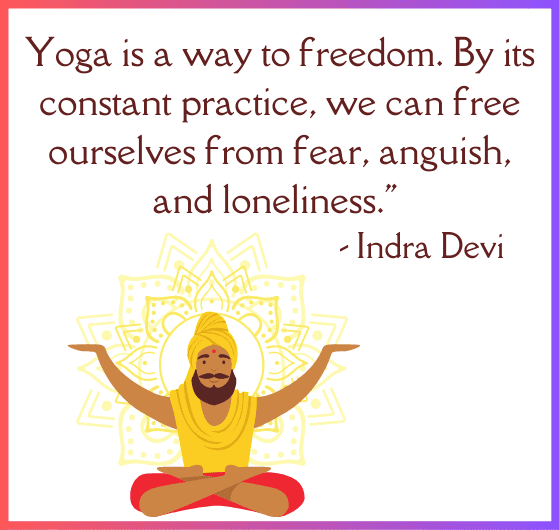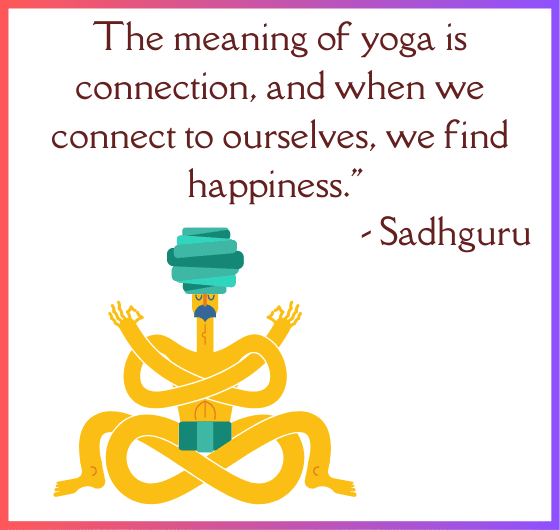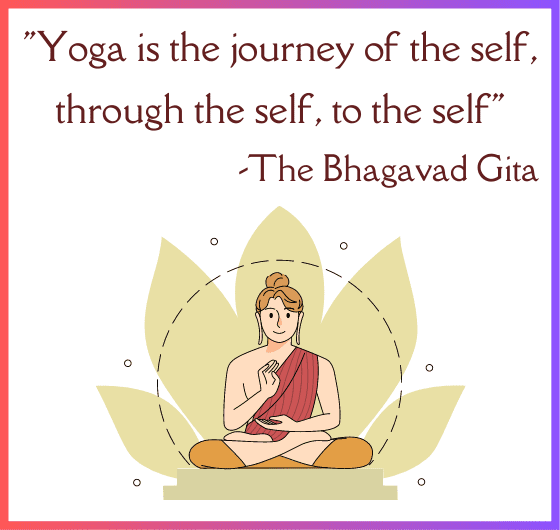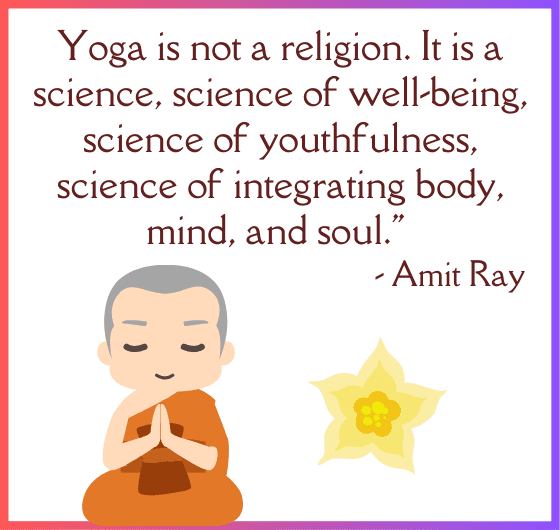The art of happiness is deeply ingrained in Indian culture, and yoga is one of the most powerful tools for achieving it. Through the physical postures, Breathwork, and meditation practices of yoga, individuals can tap into the innate joy and contentment within themselves. Yoga and happiness have been shown to reduce stress, improve mood, and increase levels of serotonin, leading to a greater sense of well-being and happiness.
In India, yoga is seen as a way of life and is often used in combination with other practices like meditation, chanting, and mindfulness to promote overall health and happiness.
By exploring the powerful connection between yoga and happiness in India, individuals can unlock the secrets to a life filled with peace, joy, and fulfillment.

The Benefits of Yoga for Happiness and Well-being in India.
“Yoga is the journey of the self, through the self, to the self.” – The Bhagavad Gita
Yoga is an ancient practice that originated in India and has gained popularity worldwide for its physical, mental, and spiritual benefits.
The practice of yoga has been associated with happiness and well-being in India for centuries, and today it continues to promote positive mental and physical health for people around the world. Here are some of the benefits of yoga for happiness and well-being in India:
>> Yoga helps reduce stress, anxiety, and depression.
>> It improves physical health and flexibility.
>> Yoga enhances mindfulness and awareness.
>> It promotes relaxation and better sleep.
>> Yoga helps build stronger connections between the body, mind, and spirit.
>> It can increase feelings of gratitude and contentment.
>> Yoga encourages positive thinking and self-awareness.
>> It promotes a sense of community and social connection through group classes and events..
Overall, practicing yoga in India can contribute significantly to an individual’s happiness and overall well-being, both physically and mentally.
The Role of Yoga in promoting mental health and Happiness in India
“Yoga is not a religion. It is a science, science of well-being, science of youthfulness, science of integrating body, mind, and soul.” – Amit Ray
Yoga has been an integral part of Indian culture for thousands of years and is known for its numerous health benefits. In recent years, yoga has gained global recognition as an effective way to improve mental health and well-being.
In India, yoga is not just a physical practice, but also a way of life that emphasizes mindfulness, self-awareness, and spirituality. Here are some ways in which yoga promotes mental health and happiness in India:
>> Reduces stress and anxiety
>> Increases mindfulness and self-awareness
>> Promotes relaxation and better sleep
>> Boosts mood and positive emotions
>> Enhances self-esteem and confidence
>> Improves focus and concentration
>> Promotes a sense of inner peace and calm
By incorporating yoga into their daily routines, Indians have long enjoyed the benefits of this ancient practice for improving their mental and emotional well-being.
Yoga as a Tool for stress reduction and Happiness in India
Yoga has been practiced in India for centuries and is now a popular form of exercise and relaxation around the world. In addition to its physical benefits, yoga has been found to have a positive impact on mental health and happiness.
Here are some ways yoga promotes stress reduction and happiness in India:
>> Yoga helps to reduce stress and anxiety by promoting relaxation and increasing mindfulness.
>> Regular yoga practice can improve mood and reduce symptoms of depression.
>> Practicing yoga can improve sleep quality, which is essential for overall well-being.
>> Yoga can help to cultivate a sense of inner peace and contentment by promoting self-awareness and self-acceptance.
>> Through the practice of yoga, individuals can develop a greater sense of connection with themselves and others, leading to increased feelings of happiness and fulfillment.
Overall, yoga is a powerful tool for promoting both physical and mental well-being, and its popularity in India continues to grow.
“Yoga is a light, which once lit will never dim. The better your practice, the brighter the flame.” – B.K.S. Iyengar

The connection between Yoga and Mindfulness for Happiness in India
Yoga is an ancient practice that originated in India and is known to promote physical, mental, and spiritual well-being. Mindfulness is a state of awareness achieved through deliberate focus on the present moment, without judgment.
The combination of yoga and mindfulness can have a profound impact on an individual’s happiness levels. Here are some ways in which yoga and mindfulness are interconnected for happiness in India:
>> Yoga postures, or asanas, promote physical flexibility and strength, which can enhance overall well-being and happiness.
>> Mindfulness can be practiced during yoga by focusing on the breath and being present at the moment.
>> Yoga can help individuals manage stress, anxiety, and depression, leading to increased happiness levels.
>> Yoga and mindfulness can help improve concentration, leading to greater productivity and happiness.
>> Regular yoga practice can create a sense of inner peace and connection to oneself, leading to greater happiness and contentment.
The Impact of Hatha Yoga on happiness levels in India
“Yoga is not about touching your toes, it’s about what you learn on the way down.” – Jigar Gor
Hatha Yoga is a branch of Yoga that focuses on physical postures, breathing exercises, and meditation techniques. It is one of the most popular forms of Yoga practiced in India and has been found to have a positive impact on mental health and happiness. Here are some ways in which Hatha Yoga can contribute to happiness in India:
>> Physical benefits: Practicing Hatha Yoga can improve physical fitness, reduce stress, and increase energy levels, all of which can contribute to happiness.
>> Mental benefits: Hatha Yoga has been found to be effective in reducing symptoms of depression and anxiety, and can also improve cognitive function and memory, leading to better overall well-being.
>> Spiritual benefits: Hatha Yoga includes meditation and relaxation techniques that can help individuals feel more connected to themselves and the world around them, leading to a greater sense of purpose and happiness.
In conclusion, practicing Hatha Yoga can have numerous benefits for happiness and well-being in India, both on a physical and mental level.
The significance of Yoga philosophy in promoting happiness in Indian culture
“Yoga is a way to freedom. By its constant practice, we can free ourselves from fear, anguish, and loneliness.” – Indra Devi
Yoga is an ancient practice that has been used in India for centuries to promote overall health and well-being. In recent years, it has gained popularity around the world as a means to reduce stress and improve physical and mental health.
However, the benefits of Yoga go beyond the physical and can also have a profound impact on happiness levels. Here are some key points:
>> Yoga philosophy emphasizes the connection between the body, mind, and spirit, promoting balance and harmony in all aspects of life.
>> The practice of Yoga can help individuals cultivate a sense of inner peace and calm, reducing stress and anxiety levels.
>> Through regular practice, Yoga can also help individuals develop greater self-awareness, compassion, and empathy, leading to deeper connections with others and increased happiness.
>> Moreover, the mindfulness and meditation practices that are central to Yoga can also help individuals develop greater resilience and coping skills, which can promote happiness and well-being in the face of life’s challenges.
Overall, the teachings of Yoga philosophy provide a comprehensive approach to promoting happiness and well-being in all aspects of life.
The Effect of Yoga on physical health and Happiness in India
“Yoga is the fountain of youth. You’re only as young as your spine is flexible.” – Bob Harper
Yoga is an ancient practice that has been widely recognized for its ability to promote physical and mental well-being. In India, the benefits of yoga for happiness and overall health have been acknowledged for centuries.
Here are some of the ways in which yoga can have a positive effect on physical health and happiness in India:
>> Yoga promotes relaxation and reduces stress, which can have a significant impact on overall happiness levels.
>> Practicing yoga regularly can help improve flexibility, strength, and balance, leading to a healthier body.
>> Yoga has been found to improve respiratory function and cardiovascular health, reducing the risk of diseases such as heart disease and asthma.
>> By encouraging mindfulness and awareness of the present moment, yoga can help individuals develop a more positive outlook on life, leading to greater happiness.
Overall, yoga has numerous benefits for physical health and mental well-being, making it an important part of Indian culture and a valuable tool for promoting happiness.

The Role of Yoga in promoting positive emotions and Happiness in India
Yoga has been an integral part of Indian culture for centuries and has gained global popularity for its physical and mental health benefits. In recent years, there has been a growing interest in the role of Yoga in promoting happiness and positive emotions. Here are some ways in which Yoga can help promote happiness in India:
>> Yoga asanas (postures) can help release tension and promote relaxation, which can lead to a sense of calm and happiness.
>> Pranayama (breathing exercises) can help reduce stress and anxiety and promote positive emotions like joy and contentment.
>> Meditation can help quiet the mind and promote feelings of peace and happiness.
>> Practicing Yoga in a group setting can promote a sense of community and social support, which can contribute to overall well-being and happiness.
>> Yoga philosophy promotes self-awareness, compassion, and mindfulness, all of which are associated with greater happiness and life satisfaction.
Overall, Yoga can be a powerful tool for promoting positive emotions and happiness in India and beyond.
“The body benefits from movement, and the mind benefits from stillness.” – Sakyong Mipham
The Benefits of Pranayama for Happiness and Well-Being in India
Pranayama, or the practice of controlling one’s breath, is an essential component of yoga practice. It has been known to have numerous benefits for both physical and mental health, including promoting happiness and well-being. Here are some ways Pranayama can promote happiness and well-being in India:
>> Reducing stress and anxiety levels, which can improve one’s mood and overall sense of well-being
>> Increasing lung capacity, which can improve energy levels and feelings of vitality
>> Promoting relaxation and better sleep quality, which can improve one’s overall mood and outlook on life
>> Enhancing concentration and focus, which can lead to a greater sense of purpose and accomplishment in life
>> Helping to regulate the autonomic nervous system, which can lead to a greater sense of inner balance and harmony.
Overall, the practice of Pranayama can be a powerful tool for promoting happiness and well-being in India, and can be easily incorporated into one’s daily yoga practice.
The connection between Kundalini Yoga and Happiness in India
“Yoga is not just repetition of few postures – it is more about the exploration and discovery of the subtle energies of life.” – Amit Ray
Kundalini Yoga is a type of yoga that focuses on the energy that lies dormant at the base of the spine. Here are some points on the connection between Kundalini Yoga and happiness in India:
>> Kundalini Yoga has been practiced for thousands of years in India and is known to promote spiritual growth and awareness.
>> The practice of Kundalini Yoga can help reduce stress and anxiety levels, leading to greater feelings of happiness and well-being.
>> The physical postures, breathing exercises, and meditation techniques in Kundalini Yoga can stimulate the release of endorphins, which can help elevate mood and reduce pain.
>> Kundalini Yoga helps practitioners develop greater self-awareness and emotional stability, allowing them to cultivate a more positive outlook on life and improve their relationships with others.
>> Kundalini Yoga can also help individuals tap into their creativity and intuition, leading to a greater sense of purpose and fulfillment in life.
>> Overall, the practice of Kundalini Yoga can be a powerful tool for enhancing happiness and well-being in individuals in India and beyond.
Yoga and Happiness: The Science Behind the Bliss
Yoga is a comprehensive practice that encompasses various elements, including physical postures (asanas), breath control (pranayama), meditation, and philosophical principles. Yoga offers numerous benefits, and it has the potential to contribute to happiness in the following ways:
1.. Physical well-being: Regular practice of yoga can enhance physical health by improving flexibility, strength, and balance. It also promotes body awareness and induces relaxation, which positively influences overall mood and happiness.
2. Stress reduction: Yoga incorporates mindful breathing and meditation techniques, aiding in calming the mind and reducing stress levels.
Through yoga, individuals learn to be present in the moment and let go of worries and anxieties, leading to increased feelings of peace, contentment, and happiness.
3. Emotional balance: Yoga encourages self-reflection and introspection. Practicing yoga helps individuals observe and understand their emotions without judgment.
Moreover, this cultivates emotional resilience and fosters a sense of balance, enabling individuals to respond to life’s challenges with clarity and equanimity, thereby contributing to their happiness.
4. Mind-body connection: Yoga emphasizes the connection between the mind and body. By practicing yoga, individuals develop a heightened awareness of bodily sensations, thoughts, and the interplay between the two.
Thereafter, this enhanced mind-body connection promotes harmony and integration, which can significantly impact happiness and overall well-being.
5. Gratitude and mindfulness: Yoga encourages the practice of gratitude and mindfulness. It teaches individuals to appreciate the present moment, be grateful for what they have, and find joy in simple things.
Also, Cultivating gratitude and mindfulness shifts perspectives towards positivity, thereby increasing happiness.
6. Community and connection: Yoga classes and communities provide opportunities for social connection and support.
Practicing yoga with others fosters a sense of belonging and camaraderie, which contributes to overall happiness and well-being.
Therefore, it is important to recognize that yoga is a personal journey, and the benefits experienced may vary from individual to individual. The key is to approach yoga with an open mind, embracing its various aspects. Consistent and regular practice is crucial for reaping the benefits of yoga and finding happiness through this practice.
The meaning of yoga is connection, and when we connect to ourselves, we find happiness.” – Sadhguru

5 interesting facts about “yoga and happiness
1.. Yoga brings on happy vibes: When you do yoga, your body releases “feel-good” hormones like endorphins, serotonin, and dopamine.
These happiness boosters make you feel relaxed, joyful, and totally blissed out.
2. Mindfulness magic: Yoga often includes a cool thing called mindfulness meditation. It’s all about being in the here and now without judging yourself.
Regular mindfulness practice can zap stress, amp up self-awareness, and skyrocket your happiness levels.
3. Superpowers for your brain and mood: Yoga is like a power-up for your brain! Studies show that it can make your brain work better and improve your mood.
It even increases the gray matter in areas that help you control your emotions, think clearly, and remember stuff. How awesome is that?
4. Yoga turns frowns upside down: Yoga teaches you to be grateful, compassionate, and think positive thoughts. It’s like a happiness boot camp!
With regular yoga, you’ll find yourself seeing the good in things, appreciating the present, and feeling way more positive about life. Get ready to rock your happiness meter!
5. Bye-bye blues, hello yoga: Say adios to feeling down! Research proves that yoga kicks depression and anxiety to the curb.
The cool moves, deep breathing, and mindfulness in yoga help your body and mind chill out. It’s like a happy pill, but way more fun and good for you.
These awesome facts show how yoga can make you feel totally groovy by pumping up your happy hormones, boosting your brain power, cultivating positivity, and banishing the blues. Get your yoga mat ready and let the happiness flow!
“Yoga is the fountain of youth. You’re only as young as your spine is flexible.” – Bob Harper
Evaluate your Life: Answer in the comments.
Qn 1. How has practicing yoga influenced your overall happiness and well-being? Reflect on the changes you have noticed in your mood, mindset, and overall happiness since incorporating yoga into your life. Consider the specific aspects of yoga that have had the greatest impact on your happiness journey.
Qn 2. How effectively do you incorporate mindfulness and gratitude into your yoga practice? Assess your level of mindfulness during yoga sessions and reflect on your ability to cultivate gratitude both on and off the mat. Explore how these practices contribute to your sense of happiness and fulfillment.
Qn 3. Are you using yoga as a tool to manage stress and enhance emotional balance? Evaluate how well you leverage yoga to cope with stress and maintain emotional equilibrium. Consider whether you have developed strategies within your yoga practice to promote relaxation, manage challenging emotions, and foster a positive mindset.
Moreover, these self-evaluation questions, provide an opportunity for introspection and personal reflection, allowing you to assess the impact of yoga on your happiness and explore areas where you can further enhance your practice. Remember to be honest with yourself and use these questions as a guide for personal growth and development.
Give your answers in the comments.
Yoga is the art of getting lost in yourself and finding yourself all over again.” – Aadil Palkhivala
Fun facts about “Yoga and happiness”
1.. Happy body, happy mind: Did you know that when you strike a yoga pose, your body releases “feel-good” chemicals called endorphins? These natural mood boosters bring on happy vibes and leave you feeling like a yoga Rockstar!
2. Happiness on the mat: Picture this: You’re in a yoga class, and you break into a big smile while holding a challenging pose. Turns out, that smile isn’t just for show! Research shows that smiling during yoga can actually trick your brain into feeling happier. So, strike a pose and flash those pearly whites!
3. Yoga, the mood magician: Yoga has some serious mood magic up its sleeve. Practicing yoga regularly can help reduce stress hormones like cortisol and boost the production of happy hormones like serotonin and dopamine. It’s like a happiness potion brewed on your yoga mat!
4. Yoga buddies for the win: Want to double the happiness? Grab a yoga buddy! Practicing yoga with a friend not only adds an element of fun and laughter to your sessions but also boosts your motivation and happiness. Plus, you can share those awesome yoga selfies together!
Moreover, these fun facts about yoga and happiness highlight the joy-inducing effects of yoga, from the release of endorphins to the brain’s response to smiling. They also emphasize the happiness-boosting benefits of regular yoga practice and the added fun of practicing with a buddy.
Get ready to unleash the happy vibes on your yoga mat and experience the blissful connection between yoga and happiness!
Yoga is the perfect opportunity to be curious about who you are” – Jason Crandell

Interesting Facts about Yoga and Happiness
1.. Fact: Firstly, engaging in regular yoga practice can significantly boost your happiness levels. Moreover, it is important to note that yoga for happiness has been a highly searched topic, with many people looking for ways to enhance their well-being through yoga.
2. Fact: Furthermore, yoga helps reduce stress and anxiety, leading to a happier state of mind. Additionally, there is a strong connection between yoga and stress relief, making it a popular choice among those seeking inner peace and happiness.
3. Fact: Moreover, engaging in yoga exercises releases endorphins, the “feel-good” hormones in your body. Additionally, the benefits of endorphins and happiness have been extensively studied, making yoga for endorphin release a popular and effective approach.
4. Fact: In addition, yoga promotes mindfulness and self-awareness, enhancing overall happiness. Furthermore, the relationship between yoga and mindfulness has gained significant attention, with people seeking yoga practices that cultivate self-awareness and contribute to a greater sense of happiness.
5. Fact: Additionally, incorporating meditation into your yoga practice can cultivate a deeper sense of happiness and inner peace. Moreover, meditation and happiness have long been associated, and many individuals find that combining yoga and meditation practices lead to a profound sense of well-being and contentment.
Story of Guru teaching “Why Yoga and happiness?”
Once upon a time, in a peaceful village nestled amidst lush green mountains, there lived a wise and enlightened Guru named Rishi. Rishi had dedicated his life to spreading the wisdom of yoga and happiness.
He believed that the path to true joy and contentment lay in the practice of yoga, and he decided to impart this knowledge to his eager disciple, Arjun.
One bright morning, Guru Rishi and Arjun sat together in the serene garden of the ashram. With a kind smile, Guru Rishi began, “Arjun, let me share with you why yoga and happiness are so important and how you can apply them in your life.”
Firstly, Guru Rishi explained, “Yoga is not just about physical exercise; it is a holistic practice that unites the body, mind, and soul. It helps us find balance and harmony within ourselves.”
He continued, “Imagine a tree with strong roots firmly grounded in the earth. Similarly, yoga provides a foundation for happiness by grounding us and connecting us with our inner selves.”
Furthermore, the wise Guru, shared an example with Arjun. “Think of a bird soaring freely in the sky,” he said. “Just as the bird experiences joy and liberation, practicing yoga can elevate our spirits and bring us a profound sense of happiness and freedom.”
As Arjun listened attentively, Guru Rishi continued, “Additionally, yoga teaches us to live in the present moment, cultivating mindfulness.
When we are fully present, we can appreciate the beauty of life and find happiness in the simplest of things.”
To illustrate this, Guru Rishi shared another insightful example. “Imagine standing by a serene lake,” he said. “As you immerse yourself in the stillness of the moment, feeling the gentle breeze caress your skin, and witnessing the ripples on the water, you experience a sense of tranquility and happiness.”
Moreover, Guru Rishi emphasized the importance of applying yoga in daily life. “It is not enough to practice yoga solely on the mat,” he explained. “We must carry the essence of yoga into our actions and interactions with others.”
He shared an inspiring story of a yogi who spread joy by performing selfless acts of kindness, teaching the village the power of yoga beyond physical postures.
In conclusion, Guru Rishi said, “Arjun, yoga, and happiness go hand in hand. By practicing yoga, cultivating mindfulness, and applying the principles of yoga in your life, you can discover a profound sense of happiness and fulfillment.”
With gratitude and newfound inspiration, Arjun thanked his Guru for his valuable teachings. From that day forward, he embraced yoga as a way of life, spreading joy and happiness wherever he went.
Through the wise words of Guru Rishi and the examples he shared, Arjun realized the true significance of yoga and happiness.
Their journey together had just begun, and they continued to explore the depths of yoga, guiding others toward a path of everlasting bliss.
Riddles make life Better
Interesting riddles related to “Yoga and happiness”:
Riddle 1: I bring peace to your mind and a smile to your face, Through postures and breath, I help you embrace. What am I?
Riddle 2: I’m in state of bliss and contentment, you see, With mindfulness and stillness, I’m the key. What is my name?
Riddle 3: I am a practice that unites body and soul, Through stretching and bending, I make you whole. What activity am I?
Riddle 4: I’m a feeling of joy that comes from within, With every inhale and exhale, I begin. What feeling do I represent?
Riddle 5: I’m a way to find peace and tranquility, With meditation and poses, you’ll feel free. What discipline do I refer to?
Riddle 6: I’m a state of mind that is calm and serene, Through yoga and mindfulness, I’m often seen. What state am I describing?
Riddle 7: I am a practice that brings harmony and grace, Through self-awareness and acceptance, I embrace. What practice am I talking about?
Answers:
Answer 1: Yoga
Answer 2: Happiness
Answer 3: Yoga
Answer 4: Happiness
Answer 5: Yoga
Answer 6: Happiness
Answer 7: Yoga
These riddles will surely encourage your audience to think about the connections between yoga and happiness. Enjoy sharing them!

